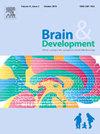利培酮和阿立哌唑降低自闭症谱系障碍患儿易怒程度的有效性和安全性:一项随机对照试验
IF 1.3
4区 医学
Q4 CLINICAL NEUROLOGY
引用次数: 0
摘要
背景:利培酮和阿立哌唑均能有效降低自闭症谱系障碍(ASD)患儿的易怒程度。然而,这两种药物之间的正面比较试验在文献中很少,并且显示出相互矛盾的结果。方法比较利培酮与阿立哌唑治疗6 ~ 18岁儿童及青少年ASD的疗效和安全性。在两周的安慰剂试验后,安慰剂应答者被排除在外。剩下的参与者被随机分为两组。结果为异常行为量表易怒子量表(ABC-I)、儿童自闭症评定量表(CARS2)、康纳斯父母评定量表(CPRS-R)、儿童睡眠习惯问卷(CSHQ)、感觉特征-2 (SP-2)、认知和治疗后出现不良事件的性质和频率的变化。结果共纳入72例患者,每组36例。ABC的变化分数(−13.6±4.3和-12.2±3.9,p = 0.15), ABC总分(−27.5±15.9和-26.8±15.7,p = 0.85),汽车得分(−2.9±0.7和-2.7±0.8,p = 0.26), CPRS-R全球指数t指数(−10.63±8.54和-9.61±8.92,p = 0.62),患者的数量明显感觉处理异常(18/36和18/36,p = 1.0), CSHQ得分(−4.6±3.8和-3.9±3.1,p = 0.39),和全面的智商(1.9±1.6和1.8±1.5,p = 0.75)之间的可比性。在多元回归分析中,CPRS-R Global Index T-score (p = 0.02)和full intelligence quotient (p = 0.03)是ABC-I评分变化的独立预测因子。两组不良事件发生频率相似。阿立哌唑组12周血清催乳素水平下降,利培酮组升高。结论利培酮和阿立哌唑在治疗儿童和青少年ASD的易怒方面具有相当的疗效和安全性。试验注册编号:印度临床试验注册中心(CTRI/2021/12/038721)。本文章由计算机程序翻译,如有差异,请以英文原文为准。
Efficacy and safety of risperidone and aripiprazole in reducing severity of irritability in children with autism spectrum disorder: A randomized controlled trial
Background
Both risperidone and aripiprazole are effective in reducing irritability severity in children with autism spectrum disorder (ASD). However, head-to-head comparison trials between these two drugs are scarce in the literature and have shown conflicting results.
Methods
This trial compared the efficacy and safety of risperidone and aripiprazole in children and adolescents with ASD, aged 6–18 years. After a two-week placebo trial, placebo responders were excluded. The remaining participants were randomized into two groups. The outcomes were the change in the irritability subscale of the Aberrant Behavior Checklist (ABC-I), Childhood Autism Rating Scale (CARS2), Conners' Parent Rating Scale-Revised (CPRS-R), Children's Sleep Habits Questionnaire (CSHQ), Sensory Profile-2 (SP-2), cognition and the nature and frequency of treatment-emergent adverse events.
Results
Seventy-two patients (36 in each group) were recruited. Changes in the ABC-I score (−13.6 ± 4.3 vs. -12.2 ± 3.9, p = 0.15), ABC total score (−27.5 ± 15.9 vs. -26.8 ± 15.7, p = 0.85), CARS score (−2.9 ± 0.7 vs. -2.7 ± 0.8, p = 0.26), CPRS-R Global Index T-score (−10.63 ± 8.54 vs. -9.61 ± 8.92, p = 0.62), number of patients with significant sensory processing abnormalities (18/36 vs. 18/36, p = 1.0), CSHQ score (−4.6 ± 3.8 vs. -3.9 ± 3.1, p = 0.39), and full-scale IQ (1.9 ± 1.6 vs. 1.8 ± 1.5, p = 0.75) were comparable between groups. In multivariate regression analysis, CPRS-R Global Index T-score (p = 0.02) and full-scale intelligence quotient (p = 0.03) were independent predictors of changes in the ABC-I score. The frequency of adverse events was similar in both groups. Serum prolactin levels decreased in the aripiprazole group at 12 weeks but increased in the risperidone group.
Conclusions
Risperidone and aripiprazole demonstrate comparable efficacy and safety in managing irritability in children and adolescents with ASD.
Trial Registry no: Clinical Trial Registry of India (CTRI/2021/12/038721).
求助全文
通过发布文献求助,成功后即可免费获取论文全文。
去求助
来源期刊

Brain & Development
医学-临床神经学
CiteScore
3.60
自引率
0.00%
发文量
153
审稿时长
50 days
期刊介绍:
Brain and Development (ISSN 0387-7604) is the Official Journal of the Japanese Society of Child Neurology, and is aimed to promote clinical child neurology and developmental neuroscience.
The journal is devoted to publishing Review Articles, Full Length Original Papers, Case Reports and Letters to the Editor in the field of Child Neurology and related sciences. Proceedings of meetings, and professional announcements will be published at the Editor''s discretion. Letters concerning articles published in Brain and Development and other relevant issues are also welcome.
 求助内容:
求助内容: 应助结果提醒方式:
应助结果提醒方式:


